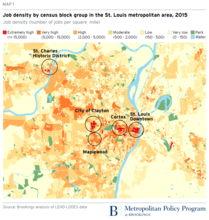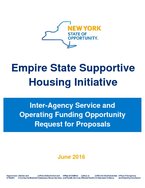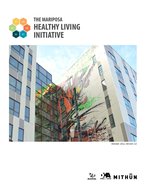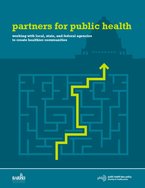Found 26 resources.
0
0
0

In the newly released Stanford Social Innovation Review article, co-authors Jessica Mulcahy, Success Measures at NeighborWorks America; Vedette R. Gavin, Verge Impact Partners; and Stacey Barbas and Kate McLaughlin, The Kresge Foundation discuss their collaborative work on a three-year developmental evaluation to learn about the strategies and approaches grantees are using to advance health equity through housing. This article is part of the series “Collaboration for Housing Justice” sponsored by Funders for Housing and Opportunity to mark their fifth anniversary.
Topics: Community development, Health, Housing, Place-based, Racial inequalities, Research
 Shared by Camille Anoll-Hunter
on Dec 15, 2022
Shared by Camille Anoll-Hunter
on Dec 15, 2022 0
0
0
This brief describes the findings of an online mapping resource that shows the distribution of Social Determinants of Health (SDOH) indicators across counties with Public Housing Primary Care (PHPC) health centers.
Topics: Place-based
 Shared by Gabe Castro
on Sep 23, 2022
Shared by Gabe Castro
on Sep 23, 2022 0
0
0

Founded in 1995 as Project Women, Family Scholar House (FSH) provides comprehensive, holistic services for disadvantaged single parents, their children, and foster alumni. The nonprofit seeks to end the cycle of poverty and transform communities by empowering families and youth to succeed in education and life-long self-sufficiency. FSH provides supportive housing, educational programming, and participant advocacy to help families gain independence.
Topics: Dual-generation, Early childhood, Education, Homelessness, Housing, Low-income, Partnerships, Place-based, Post-secondary, South, Stability
0
0
0
Type the phrase “aging in place” into a Google search, and you’ll likely see pictures of wheelchairs fitting comfortably through home doorways, bathtubs and showers with zero-step entrances, and open floorplans to facilitate seamless movement from room to room. But what is often missed in discussions promoting aging in place is that increasing livability doesn’t just mean adapting a home’s physical characteristics, it also means ensuring a range of cost options and housing types in a single community.
Topics: Disabilities, Health, Housing, Place-based, Seniors
0
0
0
The State of Arizona’s Medicaid agency (AHCCCS) recognizes the vital importance of safe, decent and affordable housing to health. With a portfolio of over 3,000 units of affordable housing for Medicaid members with a determination of serious mental illness (SMI) and/or substance use disorder, housing is a major component of how the State of Arizona assists those trying to recover and stabilize.
Topics: Health, Housing, Low-income, Medicaid / Medicare, Partnerships, Place-based
0
0
0
Build Success by engaging residents. Residents can be a strong asset in planning, communication, implementation, and compliance efforts.
Topics: Health, Housing, Legislation & Policy, Place-based, Smoke-free
 Shared by Housing Is
on Feb 4, 2019
Shared by Housing Is
on Feb 4, 2019 0
0
0
Developing effective smoke-free policies requires clear language about why the policy is being adopted, where smoking is and isn't allowed, who is responsible for reporting and investigating violations, and how the policy will be enforced.
Topics: Housing, Legislation & Policy, Place-based, Smoke-free
 Shared by Housing Is
on Feb 4, 2019
Shared by Housing Is
on Feb 4, 2019 0
0
0
A Summary of Results from the MIHOPE and MIHOPE-STRONG Start Studies of Evidence-Based Home Visiting
A healthy birth and positive experiences in early childhood can promote health and development. One approach that has improved outcomes for children and their parents is home visiting, which provides individually tailored support, resources, and information to expectant parents and families with young children. This brief summarizes recently published reports from two national studies of evidence-based early childhood home visiting: the Mother and Infant Home Visiting Program Evaluation (MIHOPE) and MIHOPE-Strong Start.
Topics: Child welfare, Dual-generation, Early childhood, Home visiting, Metrics, Partnerships, Place-based, Preventative care, Research
0
0
0

The Denver Housing Authority (DHA) wins a 2017 Award of Excellence in Client and Resident Services for creating the Health Navigators (HN) program, which provides mental health education, resources, and doctor referrals.
Topics: Disabilities, Health, Housing, Low-income, Medicaid / Medicare, Mental health, Partnerships, Place-based, Seniors
0
0
0
Communities can leverage local housing and neighborhood policies to address gun violence through tools such as demolition, vacant property maintenance and reuse, foreclosure mitigation counseling, homeownership support programs, code enforcement, and zoning.
Topics: Community development, Housing, Partnerships, Place-based, Safety
 Shared by Housing Is
on Dec 20, 2018
Shared by Housing Is
on Dec 20, 2018 0
0
0
With collectively more than 100 years of policy expertise and values-based leadership between us, Ascend at the Aspen Institute and the Housing Opportunity and Services Together initiative at the Urban Institute partnered to develop a set of recommendations on how to harness assisted housing and public-private housing partnerships for better outcomes for families.
Topics: Dual-generation, Early childhood, Education, Family engagement, Health, Housing, Low-income, Place-based, Research, Stability
0
0
0

In collaboration with Project for Public Spaces (PPS), the National Main Street Center (NMSC), and others, the Bass Center will examine the place needs of people and businesses and use that knowledge to help public, private, and civic sectors leaders develop new approaches to creating and supporting concentrations of economic activity that drive inclusive economic growth. The Center is premised on the idea that these “economic districts” represent the geographies in which leaders can have the most transformative impact—where they can build local trust and understanding, experiment safely,...
Topics: Community development, Low-income, Mobility, Partnerships, Place-based
0
0
0
The Tax Cuts and Jobs Act of 2017 provides a new incentive—centered around the deferral, reduction, and elimination of capital gains taxes—to spur private investments in low-income areas designated by states as Opportunity Zones. This provision is based heavily on the Investing in Opportunity Act (S. 1639) introduced by Senator Cory Booker (D-NJ) and Senator Tim Scott (R-SC). Given the significant interest among investors, it is possible that this new tax incentive could attract hundreds of billions of dollars in private capital, making this one of the largest economic development initiatives...
Topics: Community development, Funding, Legislation & Policy, Mobility, Place-based
0
0
0
To encourage architects and planners to design built environments that promote physical activity, New York City offers an “active design” building incentive within the Leadership in Energy and Environmental Design (LEED) standards. The Centers for Disease Control and Prevention (CDC) recommends that adults ages 18 to 65 engage in 150 minutes of moderate-intensity physical activity (MPA) or 75 minutes of vigorous physical activity (VPA) per week to reduce risk of disease and promote a healthy lifestyle, but in 2011, only 20 percent of Americans met these goals. Active design interventions...
Topics: East Coast, Exercise, Health, Housing, Low-income, Place-based, Preventative care, Research
0
0
0
More than 50 years after the passage of the Fair Housing Act, what would it take to meaningfully reduce residential segregation and/or to mitigate its negative consequences in the United States? In this volume, leading academics, practitioners, and policymakers grapple with this question, examining different aspects of the complex and deeply rooted problem of residential segregation and proposing concrete steps that could achieve meaningful change withing the next ten to fifteen years.
Topics: Community development, Legislation & Policy, Mobility, Place-based, Racial inequalities, Research
0
0
0
Practitioners working on community safety have increasingly incorporated creative placemaking techniques into their work. Creative placemaking refers to the ways in which arts and culture change how people use the places they share.
Topics: Community development, Criminal justice, Low-income, Out-of-school time, Partnerships, Place-based
0
0
0
The King County Housing Authority (KCHA), in partnership with the Highline School District and the nonprofit social service organization Neighborhood House, launched the Student and Family Stability Initiative (SFSI) pilot program in 2013 to provide housing and employment supports to homeless and unstably housed families with children enrolled in Highline elementary schools. In 2016, KCHA contracted with the Urban Institute (Urban) to conduct a process and outcome evaluation of the program’s first three pilot years. This evaluation documents how SFSI works, who it serves, and how well it...
Topics: Attendance, Dual-generation, Education, Family engagement, Housing, Low-income, Pacific Northwest, Partnerships, Place-based, Research, Stability, Workforce development, Youth
0
0
0
Time and again, taking a narrow view of health care has proven ineffective in producing meaningful change. Yet the current
thrust of health care reform remains firmly focused on traditional health care services. Reforms such as care coordination models and patient centered medical homes are necessary but insufficient for homeless populations with complex problems. Pairing such reforms with supportive housing is more likely to result in lasting health improvements and reduced costs.
Topics: Cost effectiveness, East Coast, Health, Homelessness, Housing, Legislation & Policy, Medicaid / Medicare, Place-based, Supportive housing
 Shared by Housing Is
on Jul 23, 2018
Shared by Housing Is
on Jul 23, 2018 0
0
0
The Mariposa Healthy Living Initiative began in 2009, when the Denver Housing Authority and its master planning team established physical, mental, and community health as a proxy to understand how redevelopment actions would change the quality of life for residents. The Initiative recognizes that the built environment is a determinant of health outcomes, which ultimately influence the quality and length of life for residents. The Initiative uses a responsive and rigorous approach to address environmental and social determinants of health, which include Healthy Housing, Environmental...
Topics: Housing, Low-income, Partnerships, Place-based, Preventative care, Research, Safety, Transportation, West Coast
 Shared by Housing Is
on Jul 17, 2018
Shared by Housing Is
on Jul 17, 2018 0
0
0
The Conway Center is a project of a nonprofit housing and services organization, So Others Might Eat, and a federally qualified health center, Unity Health Care, in Washington, DC. This $90 million community development initiative will colocate employment training, health care services, and affordable housing under one roof in Ward 7, an area of DC experiencing high poverty and unemployment, and poor health outcomes. The partnership aims to improve access to affordable rental housing, increase livable-wage job attainment, and connect residents to high-quality health care services. Although...
Topics: Community development, Cost effectiveness, Food insecurity, Health, Housing, Low-income, Medicaid / Medicare, Partnerships, Place-based, Stability
 Shared by Housing Is
on Jul 13, 2018
Shared by Housing Is
on Jul 13, 2018 0
0
0
This guide is intended to provide information to public health department staff and advocates about the many public agencies that make policy decisions and implement projects related to the physical environment.
Topics: Child welfare, Community development, Education, Exercise, Green, Health, Housing, Legislation & Policy, Place-based, Safety, Smoke-free, Stability, Substance abuse, West Coast
 Shared by Housing Is
on Jul 13, 2018
Shared by Housing Is
on Jul 13, 2018 0
0
0
This report examines four specific aspects of the challenge before us:
• The need for a much greater supply of homes affordable to our nation’s lowest-income seniors.
• The importance of transforming homes and communities so that seniors can age with options, a desire shared by the overwhelming majority of older adults.
• The imperative to better integrate health care and supportive services with housing, recognizing that this integration has the potential to improve health outcomes for seniors and reduce the costs borne by the health care system.
• The need to deploy technologies on a far...
Topics: Cost effectiveness, Funding, Health, Home visiting, Homelessness, Housing, Legislation & Policy, Low-income, Medicaid / Medicare, Partnerships, Place-based, Preventative care, Seniors, Supportive housing
 Shared by Housing Is
on Jul 12, 2018
Shared by Housing Is
on Jul 12, 2018 0
0
0
The Trauma Informed Community Building (TICB) model is based on BRIDGE Housing Corporation’s experience doing community building work over the past five years in the Potrero Terrace and Annex public housing sites in San Francisco, CA.
Topics: Child welfare, Community development, Dual-generation, Family engagement, Low-income, Mental health, Partnerships, Place-based, Preventative care, Research, Safety
 Shared by Housing Is
on Jul 12, 2018
Shared by Housing Is
on Jul 12, 2018 0
0
0
Topics: Child welfare, Dental, Early childhood, Education, Exercise, Family engagement, Health, Housing, Medicaid / Medicare, Mental health, Nutrition, Partnerships, Place-based, Preventative care, Seniors, Vision
 Shared by Housing Is
on Jul 12, 2018
Shared by Housing Is
on Jul 12, 2018 0
0
0
Reducing Pediatric Asthma through Home Improvements and Education
Topics: Asthma, Child welfare, Community development, Cost effectiveness, Data sharing, Early childhood, Education, Family engagement, Health, Healthy homes, Housing, Low-income, Medicaid / Medicare, Metrics, Partnerships, Place-based, Preventative care, Research, Safety
 Shared by Housing Is
on Jul 10, 2018
Shared by Housing Is
on Jul 10, 2018 







